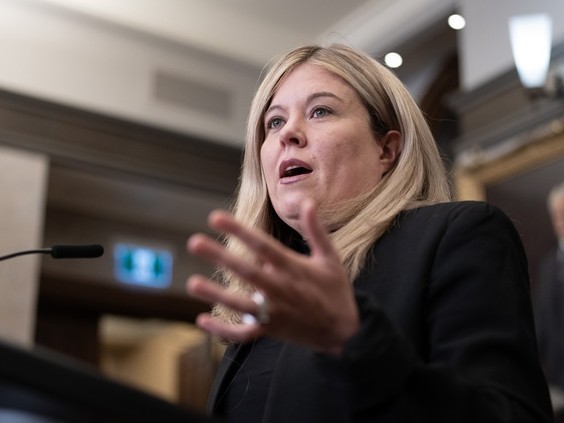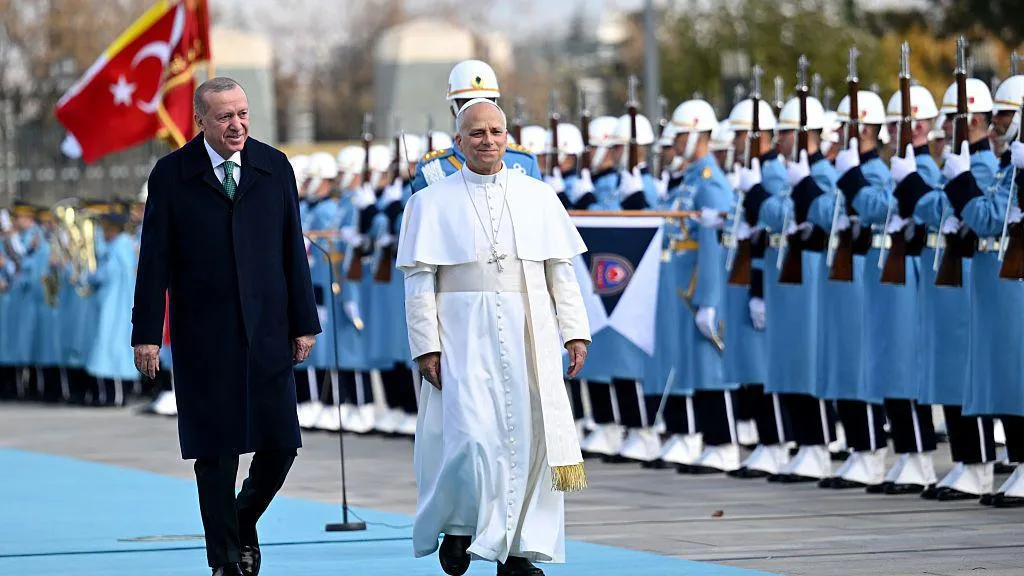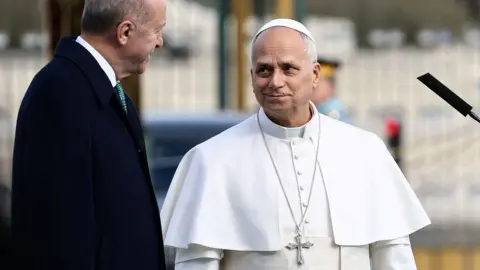 |
| Motion: Be it Resolved, it is in Israel’s national interest to support a two-state solution Munk Debates |
"I felt that last night was a victory for sanity in this city, that we can have difficult conversations on difficult issues, where people disagree."
"But we can do that with civility and substance, right?"
"And we can move forward with events like this, despite the intimidation and threats directed toward our organization."
"We support the protesters' right to free speech and to exercise whatever they want to say, as long as it's done lawfully."
"It's a shame that clearly, for some people, they decided that their behaviour would not be within the law last night.
Rudyard Griffiths, chair/moderator, Munk Debates
 |
| Toronto police lined up in front of Meridian Hall,
where anti-Israel protesters showed up to oppose an event hosted by the
Munk Debates about a two-state solution on Dec. 3, 2025. Photo by Caryma Sa'd |
The Munk Debates have featured important events over the years featuring intellectuals, academics, philosophers, leaders in government speaking to subjects of great national and international interest and importance. One that was featured on December 3 was described on the webpage for the debate: "For many Israelis a two-state solution is the only viable path to a
lasting peace, stability in the region and renewed legitimacy for the
Jewish state internationally. Others assert the attack of October 7 and two years of regional war
have made Israel’s national security, now and into the future,
irreconcilable with Palestinian statehood."
No such debate that involves Jewish/Israeli speakers on a topic hot in the news and which has been fiercely 'debated' in the streets of Canada since the horrible events of October 7, 2023, with the wild and savage assault by Palestinian terrorist groups in southern Israel on the mostly civilian population of farming communities which launched a bloodbath of Satanic proportions on children, families, the mass rape of girls and women, mutilation and torture of families, kidnapping of the elderly, of children, of the wounded, of foreign farm workers and Israeli soldiers could ever take place in a civil atmosphere. For reality, history, logic and reason are entirely outside the realm of the passion of hate.
Antisemitism has made a comeback with a bleak, dark vengeance, exemplified by masses of masked accusers of Jews, dressed symbolically in keffiyehs, screaming that Jews should return to Poland, that 'Palestine will be free', and to 'Globalize the Intefadeh'. Many among them professing not to hate Jews, only Zionists, as though the two were divisible. And so it was with the riot that took place outside Meridian Hall in Toronto, as the debate commenced.
 |
| Police clashed with anti-Israel protesters on the
evening of Dec. 3, 2025, as they opposed an event hosted by the Munk
Debates about a two-state solution in the Middle East on Dec. 3, 2025. Photo by Caryma Sa'd |
The debate featured two well-known Israelis, one a former Israeli ambassador to the United States, Michael Oren partnering with Ayelet Shaked, former Israeli minister of interior who spoke against a two-state solution. Former Israeli prime minister Ehud Olmert and former justice and foreign minister and chief peace negotiator Tzipi Livni argued in favour of a two-state solution. The event proceeded, despite the protests and a few interruptions.
Outside the event, a common enough gaggle of masked protesters holding Palestinian flags and carrying signage expressing their contempt and hatred of the State of Israel. "The world hates Israel", proclaimed one sign, while another invited "Honk4Gaza". Another protester held a megaphone and a Palestinian flag. Videos posted on social media showed hin shouting at people who were walking down the street: "Devil-worshipping Zionists! Go to hell. Go back to the slums of Europe!"
The 'protest', getting out of hand as many of them tend to do, with people carried away by their own dim-witted passion of hate saw one man arrested for assaulting a peace officer in an attempt to take possession of his weapon. Charged also with criminal harassment and uttering death threats that evening at the corner of Yonge and Front streets, according to police. Another woman was arrested on a charge of criminal harassment.
There were two protesters who had managed to enter the building, who were removed for causing a disturbance, according to a Toronto police spokesperson. One of the two escorted outside has been treated to a charge of trespass. Herut Canada, a Jewish charity that uses volunteers to monitor and safeguard Jews at such events had a presence at this one. Its former national director was there for the purpose of providing security to the Jewish community. He described hundreds of protesters gathered between 6:00 and 6:30 p.m.
Lawyer and independent journalist Caryma Sa'd posted a video on social media that showed a scuffle taking place between Toronto police officers and protesters. Another of his videos showed chants by protesters such as "War criminals!", others shouting back in chorus "Arrest them!", referring to the debate participants. They were obviously furious at the presence of prominent Israels, referring to them as "war criminals".
The protesters were there, incited by the anti-Israel Toronto4Palestine group which along with others such as they, produced a post on social media calling for an emergency rally at Meridian Hall on Wednesday, where the debate was to take place. And so, faithful Jew-haters answered the call to promote antisemitism and slander the Jewish state.
A day later, following the debate, Ayelet Shaked stated on X that the debate had been held "under heavy security. Outside, demonstrations took place. Inside the hall, some useful idiots shouted, but overall, people listened and wanted to learn."
 |
| Anti-Israel
protesters gathered outside Meridian Hall in downtown Toronto, where a
debate was being held about a two-state solution, hosted by the Munk
Debates on Dec. 3, 2025. outside an event that was part of the Munk
Debates, a debate on "the two-state solution" featuring prominent
Israelis, turned ugly on Wednesday, with two activists arrested and two
others removed from Toronto's Meridian Hall. Dec. 3, 2025. CREDIT:
Caryma Sa'd Photo by Caryma Sa'd |
"The protesters were shouting the usual nonsense: 'Israel must die','Zionists are racists'."
"What was really great to see was that our community was completely undeterred."
"Everyone came in and left safe. We made sure of it."
Aaron Hadida, former national director, Herut Canada
Labels: Anti-Israel Protesters, Meridian Hall, Munk Debates, Toronto, Two-State Solution


























